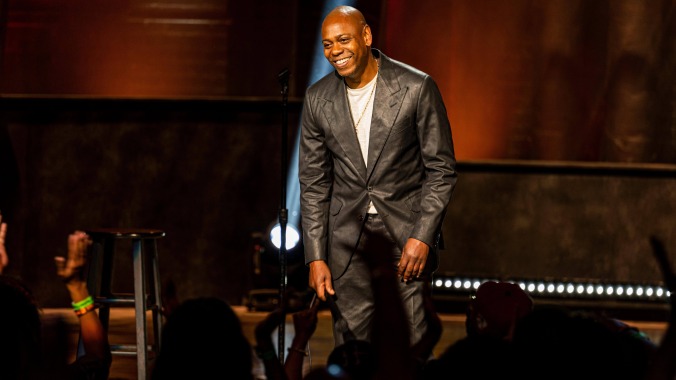Dave Chappelle’s transphobia has swallowed his comedy whole
Netflix gave the gift of hate this holiday season with The Dreamer
Aux Features Dave Chappelle
Netflix sure does love transphobia. One week after releasing Ricky Gervais’ testament to lazy provocations, Armageddon, the world’s biggest streamer did it again. The Dreamer, Dave Chappelle’s comedic nadir, is an exercise in trolling, an attempt at offending, upsetting, and endangering the lives of marginalized people for his amusement. No one is laughing harder than Dave, who stands on the same stage where he performed his breakthrough special, 2000's Killin’ Them Softly, smacking his microphone on his knee to let his overpaying audience know he’s reached another disappointing punchline. Chappelle has lost the desire to drill down on heretofore unspoken truths about society. Instead, he drops hateful grenades and runs before they blow.
Calling Chappelle’s comedy “transgressive” is inaccurate. There is nothing thought-provoking or incisive about The Dreamer, despite his best efforts to work in some half-baked line about how he’s a dreamer and how his audience is filled with dreamers, too. It doesn’t make much sense. But it wouldn’t matter if it made perfect sense because whatever groundbreaking idea Chappelle thinks he’s reaching with this turd is lost in his distracting obsession with trans people and his supposed “cancellation.”
The primary feature of The Dreamer is Chappelle’s impish smile; it’s the same “Ain’t I a stinker” smirk that graces the poster of Half Baked. It’s long been how he can connect with his audience and let them in on the joke. But now he does it to let them know he’s daring to say something he shouldn’t be. The self-described TERF lands one transphobic, homophobic, and ableist joke after another, frequently returning to his most tired callbacks. And, as Gervais did last week, he’s run out of D- trans material and has moved on to people with disabilities. Watching both revolutionary comedians do ableist act-outs as they sarcastically champion “punching down,” as if admitting to it absolves one of the crimes, is bizarre.
Put bluntly, what the fuck is this guy trying to tell us? Why should we listen? Is this even the kind of art he wants to create every three years? Is this even art? Did he do those 24-hour comedy shows for this? Chappelle describes his journey so effusively and evocatively in this very special, and he went through it all just so he could further marginalize a community under constant threat, one that’s facing horrific legislation and physical violence every day. 2023 alone saw 589 anti-trans bills introduced in 49 states. 85 passed, a 15% increase from 2022. This is an oppressed people, and their discomfort and humiliation make up 25% of The Dreamer.
Writer Seth Simons recently suggested that we stop calling Chappelle a comedian at all since his primary profession these days is an “anti-trans activist.” “The term clarifies Chappelle’s position in a broader network of relationships and systems, thereby clarifying the position of his ideology,” Simons writes. “Consider the difference between ‘Netflix invested nearly $200 million in a beloved comedian’ and ‘Netflix invested nearly $200 million in an anti-trans activist.’ One is business as usual; the other reveals a deep cultural rot.” When you consider Chappelle’s overarching message for the decade, it’s hard to disagree with the sentiment.
But Chappelle wants to convince us otherwise. He’s “done fucking with those people,” he cries out early in the special. The Dreamer opens with a quote from Henry David Thoreau and a black-and-white scene of our consummate truthteller collecting his thoughts. He must have something on his mind, right? Chappelle made a career off comedy that matters. This guy quit his series because he didn’t think his audience received his comedy appropriately. This is also the man who released 8:46, a comedy special about racial inequality and mass incarceration, named after the most infamous police killing of the modern age. He had a point to make, and he made it.
But here he wows with punchlines like “this knife identifies as a gun.” Chappelle closes with a long, meandering story about his dreams coming true and how much he enjoys watching others follow their dreams. (Except Lil Nas X, whom he seems mildly repulsed by, but still devotes his final joke to.) Like Ricky Gervais, he tries to end on a loving note, a sentimental appreciation of the audience that allowed him to live his dreams.
The thing is, in addition to some 2.5 million people who identify as transgender in the U.S., Chappelle ultimately does a disservice to himself. Whatever truths he hopes to impart to his audience about dreams or Will Smith or his relationship with his wife are so immediately swallowed by the controversies he’s created, even if Chappelle had something worth saying, no one would hear it. They’d see a thousand articles recapping all the hateful things Chappelle said in his show. With each special, he’s allowed hate to become the star. In his latest special, hate is the only clear point he makes.